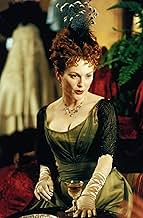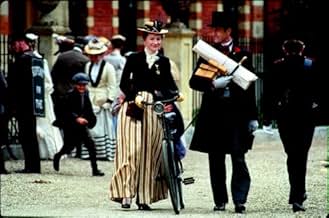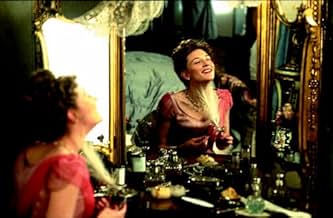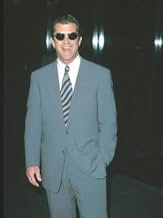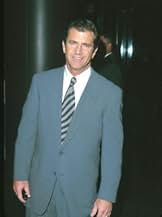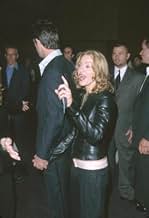NOTE IMDb
6,8/10
17 k
MA NOTE
Ajouter une intrigue dans votre langueLondon 1895: Cabinet minister, Sir Chiltern, and bachelor, Lord Goring, are victims of scheming women.London 1895: Cabinet minister, Sir Chiltern, and bachelor, Lord Goring, are victims of scheming women.London 1895: Cabinet minister, Sir Chiltern, and bachelor, Lord Goring, are victims of scheming women.
- Réalisation
- Scénario
- Casting principal
- Nomination aux 3 BAFTA Awards
- 4 victoires et 17 nominations au total
Avis à la une
One of the principal sources of humour in Wilde's plays comes from pricking at the inflated egos, pious humbug and ignorance of the upper classes. There is always a Wildean character to reverse a clicheed expression or invert conventional 'wisdom.' Unfortunately, by stripping most of his characters of their stiff formality and rigid social code, the writer and director have removed the butt of the joke and Wilde's comments on absurdity are left without a punchline. The attempt to work in anachronistic social relevance leaves us with a set of feeble characters who fall in love with each other for no obvious reason. Because Wilde's language has been sterilised the actors have to use mugging to express the personalities Wilde created. Result, a charmless and dated 'political' drama as credible as a Jeffery Archer novel. Gertrude is insecure and fretful where she should be smug and priggish- Mabel is arch where she should be caustic- Poor Oscar - gets no 'Oscar'!
To say that this film is a filmmaking tour de force would be a great injustice. It is far better than that. Oliver Parker's revitalizing of Oscar Wilde's classic play is filmmaking at its finest.
Every element of this film is superlative. Wilde's story as adapted to the screen by Parker is witty, intelligent and engaging from start to finish. Seldom can you find a story that attempts to be a romantic comedy, a tale of duplicity blackmail and betrayal, and a drama of political intrigue, and succeeds so well on all counts.
The intricate weave of deception, manipulation and double entendre along with comic misperception, irony and rapier witted dialogue are delicious and classic Wilde. This is a film you will want to see again and again, just to discover all the lines within the lines.
I cannot say enough about the brilliance of Oliver Parker's direction in this film. He has captured late 19th Century aristocratic England with vivid and rich images that put the viewer right into the period. David Johnson's cinematography is fantastic, with every scene working well as to lighting and color. The beautiful blend of colors in the costumes and the set always looked like they belonged together. Parker also provides numerous interesting camera angles that help dramatize the scenes. It serves to remind us that glorious films can still be made relying on the creative eye of the director rather than special effects.
The acting was delightful. Rupert Everett, as the self absorbed Lord Arthur Goring, delivers an exquisite performance as the unscrupulous rogue upon whom the mantle of truth and honor is laid.
Julianne Moore was delightful as the evil and cunning Mrs. Cheveley. As cold, manipulative and heartless as she is with Chiltern and Lady Chiltern, she is that vulnerable and helpless with Lord Goring, for whom she has long held a flame. Moore handles this emotional juggling act with great skill and you find yourself simultaneously loving her ingeniousness and hating her treachery.
Cate Blanchett turns in another wonderful performance as the oh-so-perfect, Lady Gertrud Chiltern. Jeremy Northam is also excellent as Robert Chiltern, the man of untouchable character with a scandalous secret in his past. Even Minnie Driver is charming as Robert's sister.
This is a terrific film for the refined viewer who appreciates all aspects of filmmaking. Even for those not into the art of filmmaking, it is simply great entertainment. I can think of no negative criticism of it. It is well written, directed, photographed and acted. It is filmmaking the way it was meant to be. A perfect 10.
Every element of this film is superlative. Wilde's story as adapted to the screen by Parker is witty, intelligent and engaging from start to finish. Seldom can you find a story that attempts to be a romantic comedy, a tale of duplicity blackmail and betrayal, and a drama of political intrigue, and succeeds so well on all counts.
The intricate weave of deception, manipulation and double entendre along with comic misperception, irony and rapier witted dialogue are delicious and classic Wilde. This is a film you will want to see again and again, just to discover all the lines within the lines.
I cannot say enough about the brilliance of Oliver Parker's direction in this film. He has captured late 19th Century aristocratic England with vivid and rich images that put the viewer right into the period. David Johnson's cinematography is fantastic, with every scene working well as to lighting and color. The beautiful blend of colors in the costumes and the set always looked like they belonged together. Parker also provides numerous interesting camera angles that help dramatize the scenes. It serves to remind us that glorious films can still be made relying on the creative eye of the director rather than special effects.
The acting was delightful. Rupert Everett, as the self absorbed Lord Arthur Goring, delivers an exquisite performance as the unscrupulous rogue upon whom the mantle of truth and honor is laid.
Julianne Moore was delightful as the evil and cunning Mrs. Cheveley. As cold, manipulative and heartless as she is with Chiltern and Lady Chiltern, she is that vulnerable and helpless with Lord Goring, for whom she has long held a flame. Moore handles this emotional juggling act with great skill and you find yourself simultaneously loving her ingeniousness and hating her treachery.
Cate Blanchett turns in another wonderful performance as the oh-so-perfect, Lady Gertrud Chiltern. Jeremy Northam is also excellent as Robert Chiltern, the man of untouchable character with a scandalous secret in his past. Even Minnie Driver is charming as Robert's sister.
This is a terrific film for the refined viewer who appreciates all aspects of filmmaking. Even for those not into the art of filmmaking, it is simply great entertainment. I can think of no negative criticism of it. It is well written, directed, photographed and acted. It is filmmaking the way it was meant to be. A perfect 10.
7=G=
"An Ideal Husband" is a charming though contrived little 19th century English period comedy with the subtly sardonic sense of humor typical of Oscar Wilde. The film, which deals with the politics of society first, the politics of the heart second, and the politics of the state last, features all the trappings of the period, a solid cast, and a clever script. An amusing and enjoyable watch for those into 19th century English period films.
An Ideal Husband - ****
In 19th Century London, Sir Robert Chiltern (Jeremy Northam,) is a successful member of parliament married to the virtuous, fabulously popular Lady Gertrud Chiltern (Cate Blanchett.) Sir Robert's sister Mabel (Minnie Driver) is infatuated with Sir Robert's friend, Lord Arthur Goring (Rupert Everett.) The dashing Lord Goring, the wealthy son of the Earl of Caversham, is an inveterate bachelor who lives a life of leisure. Into this already crowded picture drops Mrs. Laura Cheveley (Julianne Moore,) an Austrian socialite with two ex-husbands and a convoluted past. Not only was she briefly engaged to Lord Goring, but it seems that she possesses evidence that the noble Sir Robert once committed a terrible indiscretion. Mrs. Cheveley uses this explosive evidence in her attempt to blackmail Sir Robert into voting against his conscience on the floor of Parliament. What ensues is a fascinating examination of honor and idealism. We learn that the noble Sir Robert is less than perfect, while the rakish bachelor Lord Goring possesses a surprising level of honor and insight.
If Shakespeare in Love deserved an Oscar, this film deserves the Nobel Prize. It is simply outstanding in every respect. The first thing one notices is the dialogue. It is a bit stiff and stilted, as was the custom in London at the time, but it also possesses a razor sharp wit and sly sense of humor. Every last character speaks with intelligence and humor. The verbal fireworks, particularly as provided by Lord Goring, illuminate character and motivation while simultaneously producing guffaws from the audience. The plot structure is a marvel. There are no explosions, fireballs, or car chases, but the picture achieves a certain breathlessness simply through its intricate layering of multiple characters, all with intertwining motivations, interests, and connections with one another. A prime example of this is the scene in which poor Lord Goring receives multiple visitors at his home in a single night. All of the visitors have conflicts with one another, so Lord Goring must segregate them and move from room to room, listening to their problems and providing insights. The costumes and locations are all excellent. I particularly liked the manner in which Sir Robert's bright home is contrasted with Lord Goring's dark and cavernous bachelor pad. The one complaint I have is with the film's music; it seemed too light and frivolous, overplaying the "madcap shenanigans" element of the picture. But this is a minor quibble indeed.
The acting is first rate across the board. Jeremy Northam (yes, he could play James Bond) is well suited to the role of Sir Robert. He exudes intelligence, honor, and duty. Julianne Moore, as Mrs. Cheveley, seems to relish the conniving and scheming of her character. Cate Blanchett and Minnie Driver capably bring depth and intelligence to their limited roles. But the true star of the film is Rupert Everett as Lord Arthur Goring. Mr. Everett has had a promising career to this point, but An Ideal Husband is his breakout role. In this film he is witty, charming, caring, wise, devilish, and childish all at once. Lord Goring is the kind of man that makes women swoon and men flock around to hear funny stories. He reminded me of Cary Grant - only better. Someone give that man an Academy Award.
In 19th Century London, Sir Robert Chiltern (Jeremy Northam,) is a successful member of parliament married to the virtuous, fabulously popular Lady Gertrud Chiltern (Cate Blanchett.) Sir Robert's sister Mabel (Minnie Driver) is infatuated with Sir Robert's friend, Lord Arthur Goring (Rupert Everett.) The dashing Lord Goring, the wealthy son of the Earl of Caversham, is an inveterate bachelor who lives a life of leisure. Into this already crowded picture drops Mrs. Laura Cheveley (Julianne Moore,) an Austrian socialite with two ex-husbands and a convoluted past. Not only was she briefly engaged to Lord Goring, but it seems that she possesses evidence that the noble Sir Robert once committed a terrible indiscretion. Mrs. Cheveley uses this explosive evidence in her attempt to blackmail Sir Robert into voting against his conscience on the floor of Parliament. What ensues is a fascinating examination of honor and idealism. We learn that the noble Sir Robert is less than perfect, while the rakish bachelor Lord Goring possesses a surprising level of honor and insight.
If Shakespeare in Love deserved an Oscar, this film deserves the Nobel Prize. It is simply outstanding in every respect. The first thing one notices is the dialogue. It is a bit stiff and stilted, as was the custom in London at the time, but it also possesses a razor sharp wit and sly sense of humor. Every last character speaks with intelligence and humor. The verbal fireworks, particularly as provided by Lord Goring, illuminate character and motivation while simultaneously producing guffaws from the audience. The plot structure is a marvel. There are no explosions, fireballs, or car chases, but the picture achieves a certain breathlessness simply through its intricate layering of multiple characters, all with intertwining motivations, interests, and connections with one another. A prime example of this is the scene in which poor Lord Goring receives multiple visitors at his home in a single night. All of the visitors have conflicts with one another, so Lord Goring must segregate them and move from room to room, listening to their problems and providing insights. The costumes and locations are all excellent. I particularly liked the manner in which Sir Robert's bright home is contrasted with Lord Goring's dark and cavernous bachelor pad. The one complaint I have is with the film's music; it seemed too light and frivolous, overplaying the "madcap shenanigans" element of the picture. But this is a minor quibble indeed.
The acting is first rate across the board. Jeremy Northam (yes, he could play James Bond) is well suited to the role of Sir Robert. He exudes intelligence, honor, and duty. Julianne Moore, as Mrs. Cheveley, seems to relish the conniving and scheming of her character. Cate Blanchett and Minnie Driver capably bring depth and intelligence to their limited roles. But the true star of the film is Rupert Everett as Lord Arthur Goring. Mr. Everett has had a promising career to this point, but An Ideal Husband is his breakout role. In this film he is witty, charming, caring, wise, devilish, and childish all at once. Lord Goring is the kind of man that makes women swoon and men flock around to hear funny stories. He reminded me of Cary Grant - only better. Someone give that man an Academy Award.
I saw "An Ideal Husband" at the Old Vic theater in London, and was surprised at the time how timely a 100 year old play could be.
When I saw the trailers, TV ads and posters for this version, it seemed like an entirely different story--will Rupert Everett get married off. That's certainly a thread in the movie, but in the marketing of this version, they made it appear as if it was the entire wardrobe.
I didn't see the film when it was in theaters because these ads, with their very modern music and fast cutting, made the film look like a joke.
But when it came out on video, I decided to try it, and am glad I did.
The film itself is excellent. Beautifully shot and paced, with an expert cast. Wilde's humor shines through, and the writer-director has done a wonderful job "opening" up the play into a film, without changing anything important. It's a masterful job of translating from stage to screen. It's really so crisply done, and very funny.
In years to come people will realise that this is a fine movie version of this play. And by then, hopefully, they will have either forgotten about the marketing campaign, or hopefully learned from it.
I recommend the film.
When I saw the trailers, TV ads and posters for this version, it seemed like an entirely different story--will Rupert Everett get married off. That's certainly a thread in the movie, but in the marketing of this version, they made it appear as if it was the entire wardrobe.
I didn't see the film when it was in theaters because these ads, with their very modern music and fast cutting, made the film look like a joke.
But when it came out on video, I decided to try it, and am glad I did.
The film itself is excellent. Beautifully shot and paced, with an expert cast. Wilde's humor shines through, and the writer-director has done a wonderful job "opening" up the play into a film, without changing anything important. It's a masterful job of translating from stage to screen. It's really so crisply done, and very funny.
In years to come people will realise that this is a fine movie version of this play. And by then, hopefully, they will have either forgotten about the marketing campaign, or hopefully learned from it.
I recommend the film.
Le saviez-vous
- AnecdotesWhen Mrs. Chevely discovers Gertrude's letter, it is laying atop a yellow book with an Aubrey Beardsley illustration on the cover. This is apparently a copy of The Yellow Book, which was a Victorian magazine of sorts. When Oscar Wilde was arrested on charges of sodomy in 1895, he was carrying what appeared to be The Yellow Book, and because of this association, the publication was ruined.
- GaffesAt the reception at the Chiltern's home, Sir Robert is requested to meet the Indian Ambassador. In 1895 India was a British possession and there could not be such an Ambassador who represents only independent states.
- Citations
Lord Caversham: What are you doing here, sir? Wasting your time, as usual?
Lord Arthur Goring: My dear father, when one pays a visit, it is for the purpose of wasting other people's time and not one's own.
- Crédits fousThe credits list Oliver Parker, the director, as playing "Bunbury", one of the gentlemen that is seen playing cards with Lord Goring in the Men's Club when Lord Chiltern arrives. Bunbury is also a never-seen character in "The Importance of Being Earnest", the play which is performed in the background of several scenes of this film.
Meilleurs choix
Connectez-vous pour évaluer et suivre la liste de favoris afin de recevoir des recommandations personnalisées
- How long is An Ideal Husband?Alimenté par Alexa
Détails
- Date de sortie
- Pays d’origine
- Site officiel
- Langue
- Aussi connu sous le nom de
- An Ideal Husband
- Lieux de tournage
- Sociétés de production
- Voir plus de crédits d'entreprise sur IMDbPro
Box-office
- Budget
- 14 000 000 $US (estimé)
- Montant brut aux États-Unis et au Canada
- 18 542 974 $US
- Week-end de sortie aux États-Unis et au Canada
- 192 802 $US
- 20 juin 1999
- Montant brut mondial
- 18 542 974 $US
- Durée1 heure 37 minutes
- Mixage
- Rapport de forme
- 1.85 : 1
Contribuer à cette page
Suggérer une modification ou ajouter du contenu manquant

Lacune principale
By what name was Un mari idéal (1999) officially released in India in English?
Répondre

